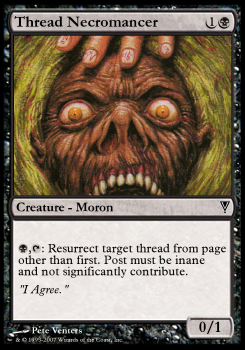Meme insider
Moderators vs. Users: A Conflict As Old As The Internet
There has always been an ebb and flow between those in positions of authority and those who they are meant to represent. Whether it’s the control of governments vs. citizens, managers vs. workers or even parents vs. children, this back-and-forth is a constant in everyday life. This eternal struggle even extends online where forums, sites or social media platforms are managed and policed by moderators (mods).
Acting as the will of the administrators (admins) and their rules, as well as frequently being community managers, mods can be found just about everywhere online these days. However, much like the schism between every single one of the examples mentioned earlier, it's a common occurrence that users see these individuals as overbearing when interfacing with the site they represent. This conflict between users and moderators, which also extends to administrators, is a source of both memes and online debates over who really drives online communities and gives them life.

This struggle predates social media to days when forums dominated the internet. Of course, not every website was a forum, but the majority of communities online could be found in a forum setting during this time. These early internet sites were still fleshing out rules, and thus admins needed a body above the average user who could watch threads, delete spam, bring attention to new information from the admins and a slew of other responsibilities. As a result, these moderators would often become the "beat cop" of forums — watching and helping to manage the day-to-day affairs of the site.
With a sense of responsibility and power that allowed them to control certain aspects of the user base, naturally, a divide began to form. If a thread was getting off the rails or was a type of shitpost, then it could be locked or removed, much to the irritation of some users.

If a user started necroposting threads for some reason, a mod could also lock it to avoid a dead topic returning to the front page. Ultimately, this meant that many users would become offended by posting what they saw as "innocent," and thus the tension between mods and users arose.
As this conflict continued evolving alongside the internet, a few common phrases sprang up when users discussed mods that eventually became common expressions for how mods interacted with users. One such example is Mods Are Asleep, originally attributed to user Omega Red on the Sputnik Music Forums in response to why a thread had remained unlocked. This, of course, spread widely as trolls and 4chan used it as a rallying cry to bring negative attention to forums when moderation was at a lull. He Does It For Free, another 4chan expression, is used to mock the site's moderators, also known as "janitors," who are accused of abusing their power or being overly sensitive.

"Mods are asleep" is still posted in various communities to this day, although to a lesser degree as bots (known as auto-mods) have become a common way for social media sites to remain moderated while their human counterparts aren't active. The second, Mods Are Gay, is commonly associated with the subreddit /r/dankmemes, who popularized it on Reddit before it spread elsewhere. Most Reddit meme subs use this phrase to some capacity, although it is inverted on subreddits like /r/Wholesomemes and others of that nature. Of course, these meme axioms share a common thread, and that is an attempt to circumvent the power of mods or unify against them.

Despite those examples still being prevalent, moderation changed considerably as the internet pivoted to social media over forums. Some things, however, remained the same between these platforms, such as user communities pushing content they wanted to see and adding to a website's overall culture. While sites may be drastically different, they still face the same challenges when it comes to moderation.
In our interview with Reddit moderator Noerdy, he explained, “One thing that users don’t understand is the number of trolls that moderators have to deal with.” Whether it be Facebook, Twitter, Reddit or an obscure gaming forum, mods across the board all deal with bad actors, spammers and trolls.
However, a major difference is the frequency of posts. On massive networks like Twitter, moderation has become somewhat automated and frequently heavy-handed due to the sheer amount of content and use of auto-mods. In a way, this has led users to attack mods more fervently, as Reddit power-user and moderator Galloboob explained to us during his interview. “Things quickly caught on fire and conspiracy theories were emerging …" he said. "Some people went as far as to try and doxx me, hack my account and sent me an endless amount of death threats.”
On the other hand, the all-too-common, heavy-handed nature of social media mods means they have equal potential to become bad actors by creating echo chambers through bans, forcing their will upon the community, or in Reddit's case, splintering the main subreddits until the content becomes drab or watered down. The social media era has changed how moderation happens, and users have reacted to it as a result.
The internet is ever-changing, yet the constant back-and-forth between mods and users will likely remain as long as there is a need for moderation. The conflict is baked into human nature, as power typically morphs the way those who wield it interact with those who don't. A regular user has no way to enforce their wants and needs on the mods, but the collective can. Communities online are the users who contribute through posts, comments and other contributions. If the community always acted in good faith, it would be fine, but trolling is perhaps inevitable. The real way that online communities maintain a solid working environment is through discussion and talks, not spiteful harassment or unwarranted banning.
Meme Insider is a Know Your Meme publication and the world's leading internet trends and culture magazine. Find out how to get your first print copy for free, and check out the Meme Insider website for more info.

Comments ( 7 )
Sorry, but you must activate your account to post a comment.